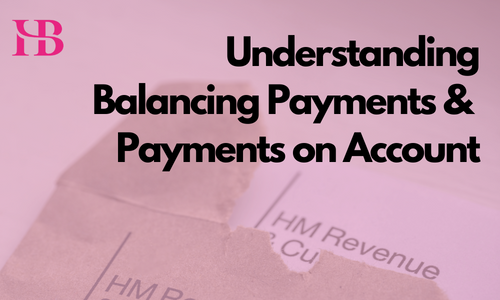A balancing payment and a payment on account are not the same thing, but they are related concepts in the UK tax system. Both are part of the process of managing your tax payments with HMRC. Here we explain the difference:

Balancing Payment to HMRC
A balancing payment is the amount you may need to pay at the end of the tax year to settle any outstanding tax liability. It takes into account your total tax liability for the year and subtracts any payments you’ve already made, such as through PAYE or other means. If the total tax liability is higher than the payments made, you’ll need to make a balancing payment. Conversely, if you’ve overpaid, you may be eligible for a tax refund.
Payment on Account to HMRC
Payments on Account are a way for HM Revenue and Customs (HMRC) to collect tax payments in advance, made during the current tax year for the following year, based on estimated future tax liability.
How do Payments on Account work?
- Income Assessment: When you submit your tax return, HMRC calculates the tax you owe for the current tax year.
- Payments on Account: If your tax liability is over a certain amount, HMRC may ask you to make Payments on Account for the next tax year. This is essentially a way of pre-paying part of your tax bill for the following year.
- Timing of Payments: Payments on Account are due in two installments. The first payment is due by January 31st of the current tax year, and the second is due by July 31st of the same tax year.
- Calculation: Each payment is typically half of your estimated tax liability for the current tax year.
Why do HMRC use the Payments on Account system?
The idea behind Payments on Account is to help you manage your tax payments more evenly throughout the year, especially if they have income sources that aren’t subject to regular tax deductions. However, it’s important to note that these payments are based on estimates, and your actual tax liability for the next year could well be different.
If your circumstances change, and you expect your income to be lower in the next tax year, you can apply to reduce your Payments on Account. If your income is expected to be higher, you may need to increase your Payments on Account to avoid a larger balancing payment later.
It’s advisable to consult with a tax professional or contact HMRC directly if you have specific questions about your Payments on Account.
Call HB Accountants for help with your self assessment tax return, accounts, VAT or payroll and more
If you want to know how to manage basic accounting tasks – or would like our help on a regular basis – do give us a call. Not only can we help with your questions, we can offer you support with your tax, management accounting and so much more. You can contact us on 01992 444466. We’re accountants for business and for people. We’re here to help.
The information contained above is for general guidance purposes only. Whilst every effort has been made to ensure the contents are accurate, please note that each individual has different circumstances and it is essential that you seek appropriate professional advice before you act on any of the information contained herein. HB Accountants can accept no liability for any errors or omission or for any person acting on or refraining from acting on the information provided in the above.
Read Our Latest Blogs Below
- Our Festive Season Opening Times
- Accounting For Beginners – All You Need To Know About Profit And Loss
- Sole Trader vs Limited Company – which is right for your business?
- Changing Accountants: moving to a new accountant
- 2023 Autumn Statement: HB Accountants’ Summary
- A Benefit-In-Kind: Are you clear about what they are and what you need to do about them?

